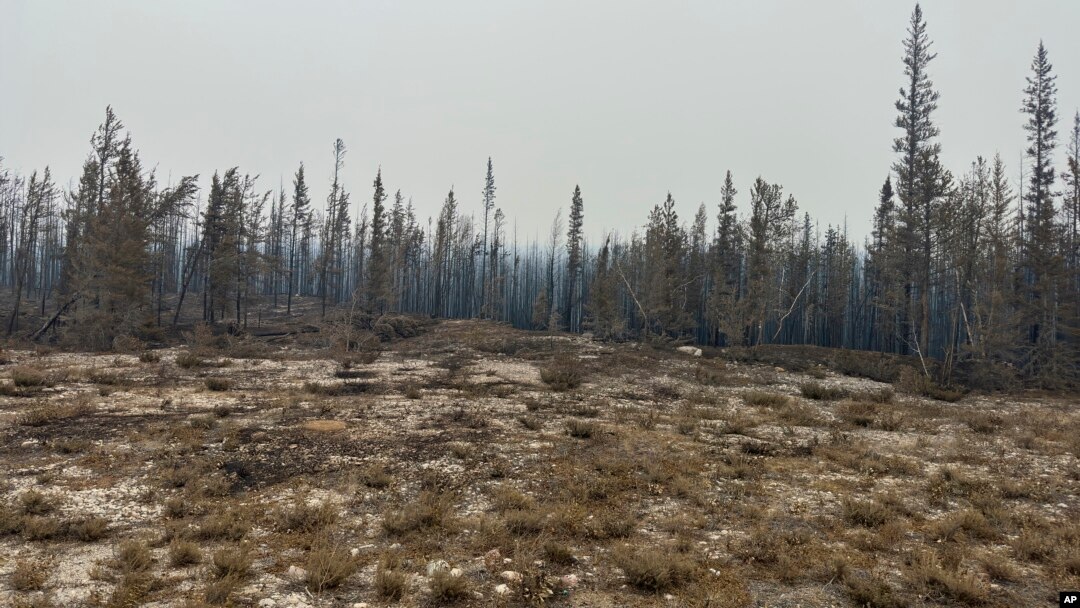Firefighters worked to keep open the only route out of the capital of Canada's Northwest Territories as a wildfire moved closer to the city of 20,000 and residents rushed to beat a noon Friday deadline to evacuate.
Air tankers flew missions overnight to keep the highway out of Yellowknife open, and authorities were guiding a long caravan of motorists through fire zones, officials said. Meanwhile, a network of fire guards, sprinklers and water cannons was being established to try to protect the city from the fire, which had moved to within 15 kilometers.
Northwest winds combined with minimal rain were complicating efforts to slow the fire, which could reach the city limits by the weekend, emergency officials said. There was a chance of limited rain on Friday, but officials said it likely wouldn't be enough to help.
“We're heading into a critical couple of days,” said Shane Thompson, a government minister for the Territories.
Thousands of people have fled the fire, one of hundreds of wildfires raging in the Territories, driving hundreds of kilometers to safety or waiting in long lines for emergency flights, as the worst fire season on record in Canada showed no signs of easing.
Ten planes left Yellowknife with 1,500 passengers on Thursday, said Jennifer Young, director of corporate affairs for the Northwest Territories’ Department of Municipal and Community Affairs, adding that the agency hopes 22 flights would leave Friday with 1,800 more passengers.
Yellowknife Mayor Rebecca Alty said the fire didn’t advance as much as expected on Thursday, but “it is still coming,” and heavy smoke that is expected to move in increases the urgency of evacuating while it’s still possible.
Alice Liske left Yellowknife by road with her six kids earlier this week because the air quality was so bad. She worried about how so many people would flee the city in such a short time.
“Not only that,” she said, “but when we go back, what will be there for us?”
Canada has seen a record number of wildfires this year — contributing to choking smoke in parts of the United States — with more than 5,700 fires burning more than 137,000 square kilometers (52,896 square miles) from one end of Canada to the other, according to the Canadian Interagency Forest Fire Center.
As of Friday morning, more than 1,000 wildfires were burning across the country, over half of them out of control. Hundreds of kilometers to the south of Yellowknife, hundreds of properties were ordered to evacuate because of the threat from a wildfire near West Kelowna, British Columbia.
SEE ALSO: Record-Setting Wildfires in Canada Could Burn Through SummerThe evacuation of Yellowknife was by far the largest this year, said Ken McMullen, president of the Canadian Association of Fire Chiefs and fire chief in Red Deer, Alberta.
“It's one of those events where you need to get people out sooner rather than later” because of the danger that the fire could block the only escape route even before reaching the community.
As people fled, Prime Minister Justin Trudeau met with his incident response group. He asked ministers to work to ensure communication services remained available and said there would be no tolerance for price gouging on flights or essential goods.
On Thursday, at the Big River Service Station about 300 kilometers (186 miles) south of Yellowknife, the line of vehicles waiting for fuel was “phenomenal,” employee Linda Croft said. “You can’t see the end of it.”
Resident Angela Canning packed up her camper with important documents, family keepsakes and basic necessities as she prepared to leave with her two dogs, while her husband stayed behind as an essential worker.
“I’m really anxious, and I’m scared. I’m emotional. ... I'm in shock,” she said. “I don’t know what I’m coming home to or if I’m coming home. There’s just so much unknown here.”
The evacuation order issued Wednesday night applied to Yellowknife and the neighboring First Nations communities of Ndilo and Dettah. Indigenous communities have been hit hard by the wildfires, which threaten important cultural activities such as hunting, fishing and gathering native plants.
About 6,800 people in eight other communities in the territory have already been forced to evacuate their homes, including the small community of Enterprise, which was largely destroyed. Officials said everyone made it out alive.
A woman whose family evacuated the town of Hay River on Sunday told CBC that their vehicle began to melt as they drove through embers, the front window cracked, and the vehicle filled with smoke that made it difficult to see the road ahead.
“I was obviously scared the tire was going to break, our car was going to catch on fire and then it went from just embers to full smoke,” said Lisa Mundy, who was traveling with her husband and their 6-year-old and 18-month-old children. She said they called 911 after they drove into the ditch a couple of times.
She said her son kept saying: “I don’t want to die, mommy.”


